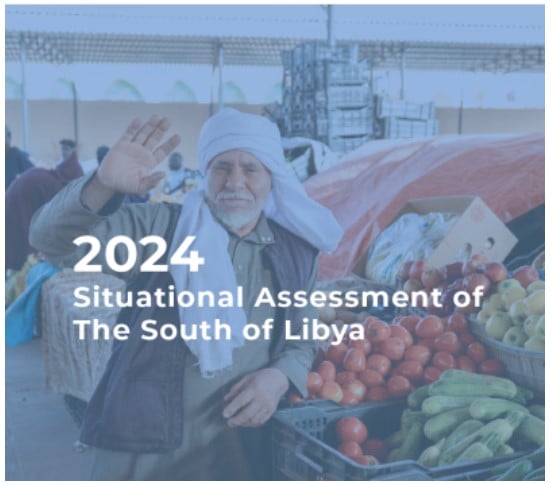The UN Libya today published its ‘‘2024 Situational Assessment of the South of Libya’’ report.
The executive summary of the 46-page report presents a detailed analysis of the challenges and opportunities facing Libya, with a particular focus on the southern region, to inform strategies for sustainable development, peacebuilding, and resilience.
Linking findings to SDGs
The analysis addresses critical gaps, identifies development priorities, and highlights the role of various stakeholders, linking findings to the Sustainable Development Goals (SDGs) to propose actionable recommendations.
Political, economic, social, and environmental challenges
The report says Libya’s post-revolution reality remains marked by political, economic, social, and environmental challenges, particularly for the southern region—encompassing key municipalities such as Sebha, Murzuq, Ghat, Kufra, and Ubari—facing acute vulnerabilities compounded by conflict, governance deficits, and systemic underdevelopment. These challenges are deeply interconnected, with governance weaknesses undermining service delivery, economic stability, and social cohesion.
Governance structures in the southern region are weak, characterized by unclear municipal roles and fragmented authority among tribal, regional, and national actors.
Political instability
Political instability and unresolved intercommunal conflicts, particularly in Murzuq and Kufra, have eroded social cohesion and stalled reconciliation efforts. Limited progress toward inclusive governance and accountability leaves long-standing grievances unaddressed, threatening the fragile peace processes underway.
Region faces significant economic instability
Economically, the region faces significant instability, with high unemployment rates, dependence on informal economies, and restricted access to financial resources. Agriculture, once a key driver of livelihoods, has been severely undermined by inadequate infrastructure, water scarcity, and the worsening impacts of climate change. Despite opportunities for green growth and renewable energy development, recovery efforts remain insufficient to tackle inequalities and create sustainable livelihoods.
Basic service delivery in the southern region is critically underdeveloped
Basic service delivery in the southern region is critically underdeveloped, with healthcare, education, water, and sanitation systems failing to meet the population’s needs. Healthcare facilities face chronic shortages of staff and supplies, while only a fraction of households are connected to functioning sewage networks. Marginalized groups, including women, youth, and displaced populations, are disproportionately affected by these deficiencies, further entrenching social inequalities.
Environmental challenges
Environmental challenges are similarly pressing, as the region is highly vulnerable to climate change impacts such as rising temperatures, water scarcity, and frequent droughts. Environmental degradation, driven by unsustainable resource use and ineffective legal frameworks, poses severe risks to agriculture and local ecosystems. While the region’s renewable energy potential remains largely untapped, efforts to enhance disaster risk management and climate adaptation are fragmented and underfunded, leaving communities increasingly vulnerable.
Updating and examining the unique dynamics of Libya’s southern regions
This update examines the unique dynamics of Libya’s southern regions, analysing the interplay of governance, social cohesion, economic development, and environmental and climate sustainability. It integrates cross-cutting issues such as gender, youth, displacement, and human rights, aligning findings with Libya’s development priorities, the SDGs and the 2030 Agenda.
Providing interconnected challenges and proposing forward-looking recommendations
By providing these interconnected challenges and proposing forward-looking recommendations, the analysis aims to guide Libyan authorities, international organizations, and development partners in crafting policies and interventions that address Libya and its southern region’s most pressing needs and support its transition toward stability and sustainable development.








